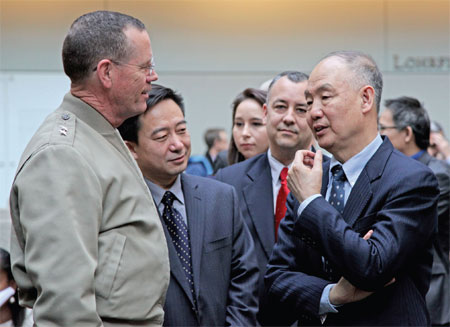US plays down rebalancing
Updated: 2013-02-28 11:41
By Chen Weihua in Washington (China Daily)
|
||||||||
|
Yang Yi (right), former director of the Institute for Strategic Studies at the People's Liberation Army National Defense University, talks with Darrell Moore, mobilization assistant to the Commander, US Pacific Command, during a lunch break for a seminar on US strategies in Asia on Wednesday at Georgetown University. Sun Chenbei / China Daily |
Official points to increasing talks, refutes containment theories
As the United States continues its focus on Asia, from military and economic standpoints, it still faces an uphill climb to convince many in China of its strategic intention.
Various polls have shown that many Chinese people see the US' rebalancing in a negative light. Many say it poses a serious threat to China's security.
The Chinese business community says the Trans-Pacific Partnership, a free trade agreement that the US has been aggressively pushing as the key economic component of its strategy in Asia, is designed to exclude China, the world's second largest economy.
But Mark Lippert, US assistant secretary of defense for Asian and Pacific Security Affairs, reassured a divided audience at a Georgetown University seminar that the rebalancing is not a zero-sum game.
"It's not about containing China. Strong bilateral relations with China are an important part of the rebalancing," Lippert said on Wednesday at the seminar assessing the US rebalancing held by the university's School of Foreign Service, the Center for Strategic and International Studies and the United States Studies Center at the University of Sydney.
Lippert cited an increasing number of talks and exchanges between the Chinese and US militaries and an invitation sent to China from former secretary of defense Leon Panetta to participate in joint military drills in 2014.
"We continue to have constructive dialogue with Chinese military," he said, adding that the military is only one component of the rebalancing strategy.
Yang Yi, former director of the Institute for Strategic Studies at the PLA National Defense University, blamed the US rebalancing for causing the worst deficit of trust between China and the US since they established diplomatic ties in the late 1970s.
He described the US rebalancing strategy as being based on the misperception that the rising China is a threat to the US and that it wants to keep the US out of Asia.
He complained about the increasing US military activities in the Asia-Pacific over the past two years since the rebalancing was launched and said the US' Asia-Pacific policies have to some extent been hijacked by its allies in East Asia.
While US officials and pundits often insist that the US has been invited back to Asia by some of China's neighbors who are frightened by an assertive China, many Chinese contend that the US rebalancing strategy has emboldened some of China's neighbors to take advantage of the mistrust between the two nations.
"The bilateral relations have been damaged in the last two years ... And it's time for the US and China to reassure each other. It's critical for the two countries to review the mistrust and to avoid confrontation," Yang said.
He hoped the US would include rather than exclude China and said the US Congress should lift some restrictions imposed on military exchanges between the two countries.
"The most difficult part for you to accept is that (the US) should be prudent in making decisions in undertaking joint military exercises with sensitive countries in sensitive areas at a sensitive time," he said, indirectly pointing to US allies in the Asia Pacific, such as Japan and the Philippines, embroiled in territorial disputes with China.
In a column for the New York Times last month, Joseph Nye Jr, a professor at the Harvard Kennedy School and a former assistant secretary of defense, warned that the US rebalancing toward Asia should not be aggressive and should ensure that China doesn't feel encircled or endangered.
"The world's two largest economies have much to gain from cooperation on fighting climate change, pandemics, cyber terrorism and nuclear proliferation," wrote Nye.
During his time working for the Clinton administration in the 1990s, he said the administration at the time rejected the notion of containment.
"If we treated China as an enemy, we were guaranteeing a future enemy. If we treated China as a friend, we kept open the possibility of a more peaceful future," he wrote.
chenweihua@chinadailyusa.com
(China Daily 02/28/2013 page1)

 In Photos: 7.0-magnitude quake hits Sichuan
In Photos: 7.0-magnitude quake hits Sichuan
 Li Na on Time cover, makes influential 100 list
Li Na on Time cover, makes influential 100 list
 FBI releases photos of 2 Boston bombings suspects
FBI releases photos of 2 Boston bombings suspects
 World's wackiest hairstyles
World's wackiest hairstyles
 Sandstorms strike Northwest China
Sandstorms strike Northwest China
 Never-seen photos of Madonna on display
Never-seen photos of Madonna on display
 H7N9 outbreak linked to waterfowl migration
H7N9 outbreak linked to waterfowl migration
 Dozens feared dead in Texas plant blast
Dozens feared dead in Texas plant blast
Most Viewed
Editor's Picks

|

|

|

|

|

|
Today's Top News
Live report: 7.0-magnitude quake hits Sichuan, heavy casualties feared
Boston suspect cornered on boat
Cross-talk artist helps to spread the word
'Green' awareness levels drop in Beijing
Palace Museum spruces up
First couple on Time's list of most influential
H7N9 flu transmission studied
Trading channels 'need to broaden'
US Weekly

|

|








